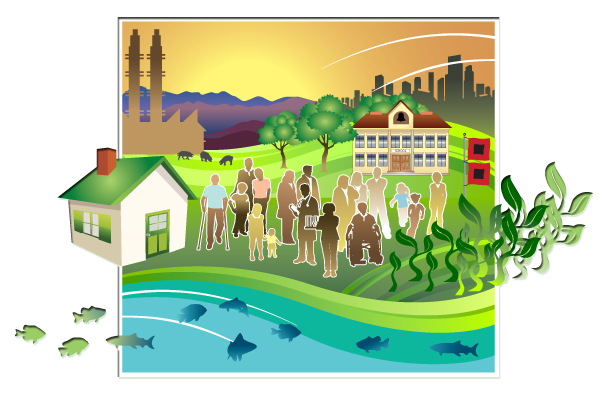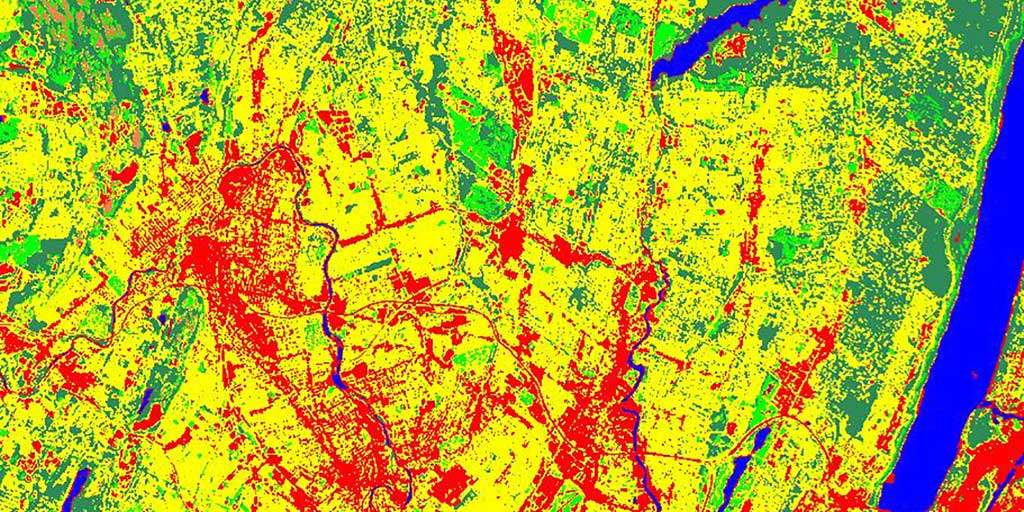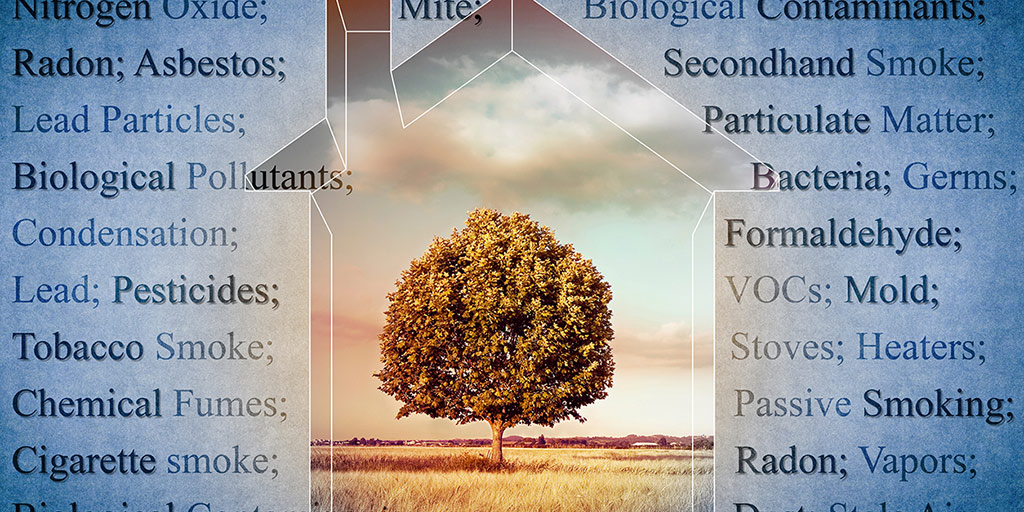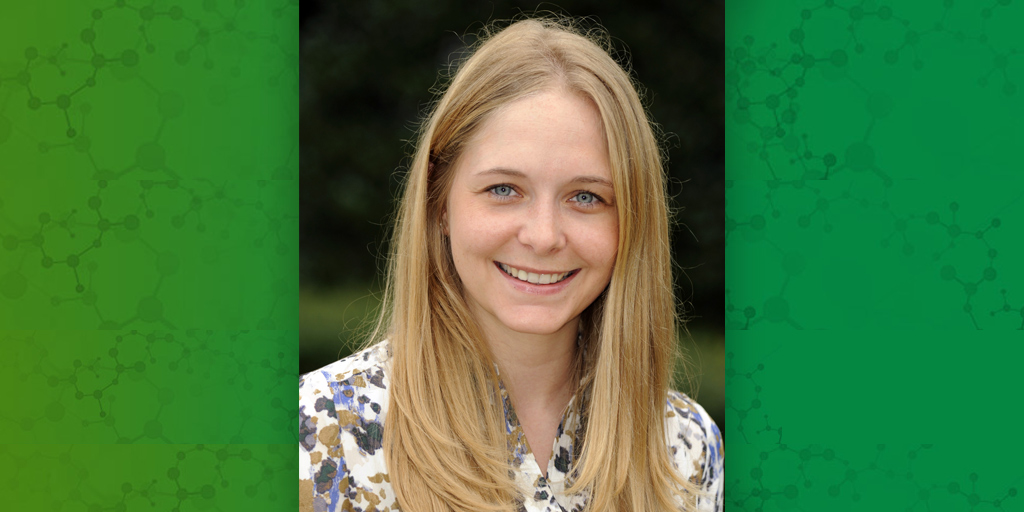Children Help Design Mobile App About Sun Protection
When it comes to creating a new health app, involving target users in the design process can provide valuable insight to developers. With this in mind, when researchers wanted to design a sun-protection intervention for children, they involved elementary school children in an iterative design process that ultimately led to the development of a mobile-based intervention, the Mobile SunSmart app. The app provides general educational material about sun exposure, personalized information about sun exposure risk, and just-in-time alerts to encourage sun protection. The design process is detailed in a recent paper about the making of Mobile SunSmart.
“If kids really learn and internalize sun protection practices at a young age, they’ll carry those habits with them through their lives. But currently available school-based interventions that teach sun protection are only moderately effective,” said Jimi Huh, Ph.D., an NIEHS grantee and preventive medicine researcher at the University of Southern California. “That was the gap we were trying to address, and we knew that having a true and meaningful partnership with children and their families would help maximize our intervention’s utility.”
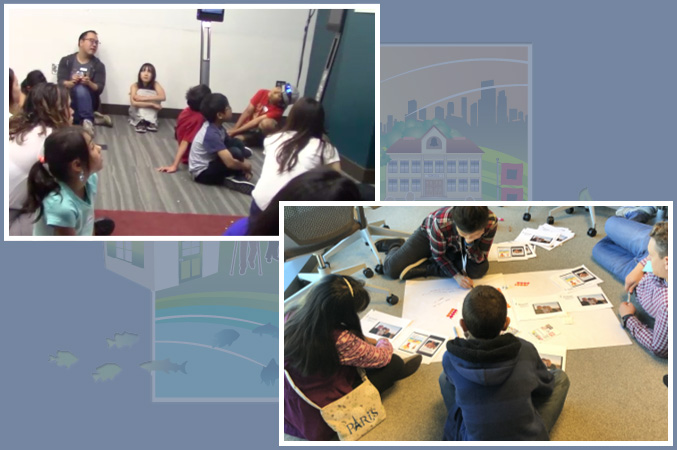
Children engaged in the Mobile SunSmart design process. (Photo courtesy of Jimi Huh, Ph.D.)
The researchers partnered with two groups of children — technology experts and subject experts — to design the app. The technology experts had knowledge in technology and usability, while the subject experts had their own experiences relating to sun exposure, sun protection, and technology usage. Each group of children participated in three design workshops from summer 2019 to summer 2020.
“We didn’t want the kids to just give us feedback on an intervention that researchers had already built – that would have meant the fundamental design was driven by adults. We really wanted the kids to be equal partners so their ideas could inform the intervention’s design from the ground up. The children’s parents’ input and collaboration were also critical,” said Huh.
Engaging Children as Equal Research Partners
Involving children as equal and equitable research partners requires intentional effort, as children do not immediately become design partners from the first day. It takes time to build trusted relationships in which children feel comfortable enough to share ideas and partner equally with adults. The researchers were also intentional in how the children were recruited and engaged in the co-design workshops.
To recruit the technology expert children, the researchers turned to KidsTeam UW, an ongoing intergenerational co-design group at the University of Washington that meets twice a week throughout the school year. All the technology expert children involved in the Mobile SunSmart project had at least one year of experience co-designing projects, so they were comfortable with this type of collaboration with adults.
“Co-designing technology over the course of a year or several years gets you deeper engagement with children who will be honest and not afraid to tell adults what they really think,” said Jason Yip, Ph.D., director of KidsTeam UW.
During the Mobile SunSmart workshops, the technology expert groups did hands-on educational activities that were part of an already-established classroom curriculum about sun protection. The groups then discussed how to best digitize those activities in a mobile intervention and how to encourage children to continuously wear sensors or their mobile phones so that the app would be maximally useful.
The subject experts were recruited through elementary schools and after-school programs near the University of Southern California. Since most parents are responsible for their children’s sun protection, the researchers included parents in the subject expert co-design workshops.
The researchers used techniques they learned from KidsTeam UW to lead these workshops. For example, the researchers recognized that engaging parents and children requires different strategies. Therefore, parents and children were separated into small peer groups to maximize participant comfort in discussing potentially sensitive topics and to allow for discussion of different aspects of sun protection. Subject expert groups discussed design ideas that had evolved from the technology expert workshops and ways to improve the ideas.
Using Children’s Input to Create the Intervention
After the six initial co-design workshops with KidsTeam UW, the team started the next design phase – incorporating the children’s and parents’ ideas into specific features of the app.
In the workshops, both children and parents agreed that storytelling is an effective teaching strategy since app users would be able to relate to characters in a story. Therefore, rather than formal, didactic lessons about sun protection, the app conveys important information through storytelling. The stories address different real-life scenarios that participants brought up in the co-design workshops, such as whether being underwater is protective against ultraviolet exposure.
Other app features also directly reflect input from the workshops. For example, children’s concerns over privacy led the team to include extra information for parts of the app that ask for personal information, such as eye color (as an indicator of melanin). The added information empowers children as users and minimizes suspicion of the app. Additionally, technology expert children were concerned with minimizing user burden and the amount of irrelevant information the app gave them. Therefore, it delivers just-in-time alerts based on data that accounts for the user’s location, whether the user is outside or inside, person-level data such as skin type, the real-time ultraviolet index at the user’s location, and how long the user has been outside.
“As we worked with the children, we could see that they became increasingly confident in their abilities and invested in the process to be design partners with adults,” said Huh. “We also noticed that some of the children became more interested in science or technology as a result of their involvement in our design process. They were very engaged and excited that their thoughts and critiques were being taken seriously and reflected at every iteration of the development. We are definitely looking forward to continuing this work.”
What’s next for the Mobile SunSmart intervention? Now that it’s been fully designed and created, the research team is looking forward to continuing their work with different groups of children to pilot test a beta version of the intervention.
“We think we have a great tool and are eager to test it with a new group of kids,” said Huh. “We’ll be looking at things like engagement with using the app daily, but also whether usage predicts sun-protective behavior and how the process of internalizing healthy habits unfolds. We hope that this scalable approach to a mobile intervention to improve sun protection will lay the foundation for future public health investigators in other areas.”
New Strategic Plan on Minority Health and Health Disparities
The National Institute on Minority Health and Health Disparities recently released its 2021-2025 strategic plan. The plan was developed in collaboration with all NIH Institutes, Offices, and Centers and with external experts and communities impacted by health disparities. It demonstrates NIH’s commitment to improving minority health and reducing health disparities.
The plan’s goals fall into three categories:
For easy online browsing, the plan is divided into sections, including the summary of categories and goals, definitions and parameters, scientific goals, outreach goals, and future plans. Alternatively, you can read the plan in its entirety.
Global Environmental Health Podcast on Wildfires and Indigenous Populations
NIEHS’s Global Environmental Health program released a podcast about wildfires and Indigenous populations in March. Wildfires and exposure to wildfire smoke pose threats to human health, such as burns, respiratory illnesses, and mental health issues. Indigenous populations have unique ancestral knowledge of the land which have given rise to best practices for managing it. In this podcast, experts talk about the health effects of wildfires and emergency management, Indigenous fire practices to mitigate wildfire intensity, and the compound effects of climate change on wildfires. The speakers are Emily Dicken, Ph.D., who is the Director of Emergency Management with the First Nations Health Authority in British Columbia, Canada; Bill Tripp, a Karuk tribal member and Director of Natural Resources and Environmental Policy for the Karuk Tribe Department of Natural Resources in northern California; and David Bowman, Ph.D., the Director of the Fire Centre at the University of Tasmania in Australia.
Pharmacy Students Gain Rural Health Assessment Experience
An NIEHS grantee, Christopher Migliaccio, Ph.D., conducted a training in which pharmacy students participated in screening events to assess the effects of wildfire smoke on human health in Seeley Lake, a remote Montana town situated between two designated wilderness areas. The unique training opportunity gave them experience with rural community patient interactions in response to an environmental health emergency and allowed health professionals and researchers to assess individual and community health after an extreme wildfire smoke event. Faculty from the University of Montana’s Center for Environmental Health Sciences and Skaggs School of Pharmacy recruited students who were in clinical rotations in their fourth year. Students were required to fulfill a minimum of two hours of supplementary training and education on human research guidelines before assisting with patient surveys, physiological testing, and blood pressure and medication counseling. The researchers hope that their study provides the groundwork for pharmacy students to participate in health care responses to public health emergencies in the future. More details about this work can be found in a paper published in May 2021, Providing APPE Pharmacy Students Rural Health Assessment Experience Following Wildfire Event in Western Montana.
NIH Checklist for Communicating Science and Health Research to the Public
NIH has published a checklist for communicating science and health research to the public. The list reflects the expertise of varied stakeholders within the NIH community, and is meant to be used by scientists, health professionals, health educators, patients, and the general public. The first section of the checklist, Setting the Stage, has items such as explaining why the research is important, providing perspective for the study, conveying information in a respectful tone that doesn’t stigmatize or assign blame, and carefully reviewing the chosen language. The second section, Describing the Science, has advice such as identifying whether the study involved human or other model systems and explaining the limitations of the study’s endpoint. Many of the items in the checklist link to more detailed explanatory articles. The checklist is a work-in-progress, and NIH welcomes comments, advice, and additions via email. NIH also has other resources to help science communicators improve the quality and usefulness of information they share with the public, including a March 2021 article on battling misinformation through health messaging.
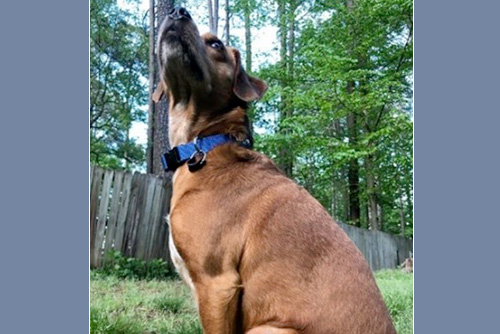
PEPH Environmental Health Chat Podcast Series
Dogs Shed Light on Chemical Exposures and Disease
PEPH Environmental Health Chat Podcast Series
Dogs Shed Light on Chemical Exposures and Disease
You can find more podcasts on the Environmental Health Chat webpage or subscribe to the series on iTunes. We want your feedback! Send comments and ideas for future podcasts to [email protected].

PEPH Grantee Highlight
Luz Huntington-Moskos, Ph.D.
Luz Huntington-Moskos, Ph.D., works to increase science literacy in youth and community groups throughout western Kentucky. She is the director of the Community Engagement Core at the University of Louisville’s Center for Integrative Environmental Health Sciences. Huntington-Moskos believes that a foundation of environmental health literacy will lead to healthier individuals and communities. Most of her work is with adolescents because she believes they are an untapped resource with a lot of creativity. Huntington-Moskos has led high school students through virtual, hands-on activities and regularly engages them in discussions about environmental exposures found in their communities. These discussions allow her to share knowledge and gather feedback from youth about their environmental health concerns. She then uses what she learns from the high schoolers to bridge varying land-use perspectives among stakeholders in the research conducted by the Center for Integrative Environmental Health Sciences.
Funding Opportunites
Transition to Independent Environmental Health Research (TIEHR) Career Award (K01 Independent Basic Experimental Studies with Humans Required)
The Transition to Independent Environmental Health Career Award is a 3-year bridge scholar development program for newly independent faculty who intend to pursue research careers in environmental health sciences. This funding opportunity is designed for applicants proposing to serve as the lead investigator of an independent clinical trial, a clinical trial feasibility study, or a separate ancillary study to an existing trial. For applicants not planning independent basic experimental studies with humans, there are two companion funding opportunities. Applicants planning independent clinical trials with specific application towards processes or with products in mind, must apply to the companion funding opportunity announcement, Transition to Independent Environmental Health Research (TIEHR) Career Award (K01 Clinical Trial Required). Applicants not planning an independent clinical trial, or proposing to gain research experience in a clinical trial led by another investigator, must apply to companion funding opportunity announcement, Transition to Independent Environmental Health Research (TIEHR) Career Award (K01 Clinical Trial Not Allowed). At the conclusion of the career development period the candidates are expected to demonstrate they can successfully compete for research funding in the environmental health sciences. Eligible candidates for the K01 award must have a research or health-professional doctoral degree and must be within three years of their appointment to their first independent faculty position at the time of submission (receipt date) of the application.
Deadlines: June 12, 2021; October 12, 2021
Research on Autism Spectrum Disorders (R01 Clinical Trial Optional)
This award supports research designed to elucidate the etiology, epidemiology, diagnosis, and optimal means of service delivery in relation to Autism Spectrum Disorders (ASD). The Research Project Grant (R01) mechanism supports discrete, specified projects based in scientific areas that represent the investigators’ specific interests and competencies, and that fall within the mission of the participating NIH Institutes and Centers. Additional companion funding opportunities are available for a Small Research Grant (R03) which supports small, discrete, well-defined projects that can be completed in two years and that require limited resources (Research on Autism Spectrum Disorders (R03 Clinical Trial Optional)); and an Exploratory/Developmental Grant (R21) which encourages exploratory/developmental research by providing support for the early and conceptual stages of project development (Research on Autism Spectrum Disorders (R21 Clinical Trial Optional)). Basic research into the pathophysiology of ASD, including research on brain mechanisms, is of special interest. Also, of high priority are clinical and applied investigations that may lead to the development of new treatments and interventions.
Deadlines: June 16, 2021; October 16, 2021
Native American Research Centers for Health (NARCH) (S06 Clinical Trial Optional)
Invites applications from federally recognized Tribes and Tribal organizations for the Native American Research Centers for Health initiative, which supports biomedical research and career enhancement opportunities to meet health needs prioritized by American Indian or Alaska Native communities. The initiative also supports research capacity building and the development of research infrastructure to enhance the biomedical research capabilities of these communities.
Deadline: June 24, 2021
Letter of Intent: Due 30 days prior to the application due date
Emergency Award: RADx-UP - Social, Ethical, and Behavioral Implications (SEBI) Research on Disparities in COVID-19 Testing Among Underserved and Vulnerable Populations (U01 Clinical Trials Optional)
Uses an emergency U01 mechanism to support the Rapid Acceleration of Diagnostics-Radical (RADxSM-UP) initiative. Research proposed in response to this FOA should address social, ethical, behavioral, structural, environmental, historical and policy factors, including structural racism within public health and health care delivery systems, that lead to disparities in access to and uptake of COVID-19 testing in underserved and/or vulnerable populations. SEBI applications are not required to conduct or administer COVID-19 testing and should not propose the actual administration COVID-19 testing or vaccination as the primary activity or aim.
Deadline: July 7, 2021
Emergency Awards: Community-engaged COVID-19 Testing Interventions Among Underserved and Vulnerable Populations – RADx-UP Phase II (U01 Clinical Trial Optional)
Provides an expedited funding mechanism to support Phase II of the Rapid Acceleration of Diagnostics – Underserved Populations (RADxSM-UP) initiative. These two-year Testing Research Projects will (1) expand the scope and reach of RADxSM-UP testing interventions to reduce COVID-19 disparities among underserved and vulnerable populations and (2) address scientific questions on interventions to increase access and uptake of COVID-19 testing given the increasing availability of SARS-CoV-2 vaccines. Phase II projects will apply scientific knowledge gained in 2020 and 2021 to develop and evaluate interventions with the goal of conducting testing to decrease disparities that contribute to the increased risk of COVID-19 infections, hospitalizations, and mortality. Projects will help to understand and address disparities in testing and the effects of testing combined with other mitigation strategies on infection rates, transmission, and outcomes. Applicants are encouraged to develop research or engagement partnerships with the Community Engagement Alliance (CEAL) Against COVID-19 Disparities initiative, where geographically appropriate.
Deadline: July 7, 2021
Hubs of Interdisciplinary Research and Training in Global Environmental and Occupational Health – Research (Collaborative U01 Clinical Trial Optional)
Solicits applications for research projects in linked Hubs of Interdisciplinary Research and Training in Global Environmental and Occupational Health (GEOHealth). This collaborative award supports research at an institution in a Low- or Middle-Income Country (LMIC), while this FOA (Hubs of Interdisciplinary Research and Training in GEOHealth – Research Training (Collaborative U2R Clinical Trial Optional)) supports research training at a U.S. institution. Applications submitted in response to both FOAs must demonstrate extensive coordination between these two awards. The overall objective of the GEOHealth program is to support the development of institutions in LMICs that will serve as regional hubs for collaborative research, data management, research training, curricula and outreach material development, and policy support around high priority local, national, and regional environmental and occupational health threats. NIEHS is interested in supporting research and research training in LMICs that address or seek to understand how exposures to toxic environmental insults alter biologic processes, are linked to disease initiation, progression or morbidity, and activities that lead to the development of prevention and intervention strategies to reduce environmentally induced diseases. Topics and disease outcomes of particular interest include airway diseases, cardiovascular disease and neurological disorders, children’s environmental health and the unique vulnerability of developing children to harmful environmental exposures including outcomes such as low birth weight or premature birth, climate change and human health, and research exploring exposures during early life stages or critical windows of susceptibility that may directly or indirectly affect the risk of developing disease. NIEHS supports research examining health consequences due to the interplay between environmental exposures and cofactors such as infectious agents or social factors that contribute to environmental health disparities.
Deadline: July 8, 2021
Letter of Intent: Due 30 days prior to the application due date
NIH Countermeasures Against Chemical Threats (CounterACT) Early-stage Investigator Research Award (R21 Clinical Trial Not Allowed)
Recruits Early Stage Investigators to pursue research programs of interest to the NIH Chemical Countermeasures Research Program under the NIH CounterACT grant/cooperative agreement program. Projects may be exploratory, applied, proof of principle, or high risk-high impact research to discover safe and effective therapeutics to mitigate toxicities resulting from exposures to highly toxic chemicals. No preliminary data are required, expected, or encouraged. However, if available, minimal preliminary data are allowed. All preliminary data should be clearly marked and limited to one-half page, which may include one figure. Projects will have an extended level of support (3 years) and are expected to generate preliminary data that would facilitate the development of competitive applications for more extensive funding support from the NIH CounterACT programs or other related initiatives.
Deadline: July 27, 2021
Letter of Intent: June 27, 2021
SBIR E-Learning for HAZMAT and Emergency Response (R43/R44 Clinical Trial Not Allowed)
Encourages Small Business Innovation Research (SBIR) grant applications from small business concerns that propose to further the development of Advanced Technology Training (ATT) products for the health and safety training of hazardous materials (HAZMAT) workers; waste treatment personnel; skilled support personnel associated with an emergency/disaster; emergency responders in biosafety response, infectious disease training and cleanup; emergency responders in disasters and resiliency training; and for ATT tools to assist in responding to environmental disasters. The major objective of the NIEHS Worker Training Program (WTP) is to prevent work related harm by assisting in the training of workers in how best to protect themselves and their communities from exposure to hazardous materials. NIEHS encourages applicants to review the SBIR E-Learning for HAZMAT Program, to pursue partnerships and collaboration with awardees of the WTP program, and to design new technology-enhanced training methods or e-Learning products that can enhance the existing NIEHS supported curricula and training programs while adhering to the Minimum Health and Safety Training Criteria: Guidance for Hazardous Waste Operations and Emergency Response (HAZWOPER) and HAZWOPER-Supporting Training.
Deadline: July 30, 2021
Letter of Intent: June 30, 2021
Understanding and Addressing the Impact of Structural Racism and Discrimination on Minority Health and Health Disparities (R01 Clinical Trial Optional)
This initiative will support (1) observational research to understand the role of structural racism and discrimination in causing and sustaining health disparities, and (2) intervention research that addresses structural racism and discrimination in order to improve minority health or reduce health disparities. NIEHS is interested in observational research examining the role of structural racism and discrimination as a significant determinant in environmental health disparities, or evidence-based intervention research that mitigates or prevents the negative health outcomes attributable to environmental structural racism and discrimination. Applicants are strongly encouraged to utilize community engaged research approaches and include letters of support from community partners. Applications that demonstrate collaborative (i.e., community-academic partnerships) approaches to understand and/or address the negative health effects of environmental structural racism and discrimination across multiple health disparity communities will be prioritized. Areas of specific interest to NIEHS include, but are not limited to: single or combined environmental exposures affecting the health of communities; health impacts of climate change, extreme weather and natural or human caused disasters; the built environment and greenspace, including green gentrification; studies grounded in community identified concerns around the intersection of environmental structural racism and discrimination and health outcomes; the impact of environmental structural racism and discrimination on health outcomes across the lifespan; and the role of environmental structural racism and discrimination in occupational exposures.
Deadline: August 24, 2021
Letter of Intent Deadline: July 20, 2021
NIH Countermeasures Against Chemical Threats Research Centers of Excellence (U54 Clinical Trial Optional)
The mission of the NIH CounterACT program is to foster and support research and development of new and improved therapeutics for chemical threats. Chemical threats are toxic chemicals that could be used in a terrorist attack or accidentally released from industrial production, storage or shipping. They include traditional chemical warfare agents, toxic industrial chemicals, pharmaceutical-based agents, and pesticides. The Centers will contain at least three research projects supported by an administrative core, up to three optional scientific cores, a research education core, and a pilot project program to support short-term innovative research and recruitment of new investigators into the field of medical countermeasures research. Each research project must include milestones that create discrete go or no-go decision points in a progressive translational study plan.
Deadlines: September 14, 2021; September 13, 2022; September 12, 2023
Letter of Intent: Due 30 days prior to the application due date
Support for Research Excellence – First Independent Research Award (R16 Clinical Trial Not Allowed)
The purpose of the Support for Research Excellence – First Independent Research (SuRE-First) awards is to support research grants for faculty investigators who have not had prior independent external research grants. A SuRE-First applicant must identify a scientist based in the U.S. with expertise and an extramural funding record in the proposed field of research to serve as a mentor. SuRE-First-supported projects must have student participation in the execution, analysis, and reporting of the research. Awards are open to institutions that receive no more than $6 million per year from NIH Research Project Grants and additionally enroll at least 25% of undergraduate students supported by Pell grants, or are an accredited medical/health professional school with a historical mission statement that explicitly states that it was founded to educate students from nationally underrepresented backgrounds.
Deadlines: September 28, 2021; September 28, 2022; September 28, 2023
Addressing Health Disparities Among Immigrant Populations Through Effective Interventions (R01 Clinical Trial Optional)
Supports research to design and implement effective interventions to enhance health advantages and reduce the health disparities among U.S. immigrant populations, particularly migrant workers, recent and first-generation immigrants. This announcement calls for multidisciplinary/multilevel research focusing on the design and implementation of effective interventions that will address immigrant-specific factors to reduce health disparities. A framework to demonstrate the multidomain, multilevel factors that may influence health disparities is available here. A life-course perspective is encouraged with interventions focusing attention on transition points across the lifespan and associated risk and protective factors for immigrant populations. Projects should involve collaborations among relevant stakeholders in U.S. immigrant population groups, such as researchers, community organizations, healthcare providers, public health organizations, consumer advocacy groups, and faith-based organizations. Projects must focus on immigrants from one or more NIH-designated populations that experience health disparities in the U.S., which include racial and ethnic minorities (Blacks or African Americans, Hispanics/Latinos, Asian Americans, and Pacific Islanders).
Deadlines: February 5, 2021; June 5, 2021; October 5, 2021
Addressing the Etiology of Health Disparities and Health Advantages Among Immigrant Populations (R01 Clinical Trial Not Allowed)
Supports innovative research to understand factors uniquely associated with the immigration experience that contribute to health disparities or health advantages among U.S. immigrant populations, particularly migrant workers, recent and first-generation immigrants. This announcement calls for multidisciplinary research to address the specific underlying causes and mechanisms of health disparities and health advantages. A framework to demonstrate the multidomain, multilevel factors that may influence health disparities is available here. Projects should involve collaborations among relevant stakeholders in U.S. immigrant population groups, such as researchers, community leaders and organizations, public health organizations, consumer advocacy groups, faith-based organizations, and healthcare providers. Projects must focus on immigrants from one or more NIH-designated populations that experience health disparities in the U.S., which include racial and ethnic minorities (Blacks or African Americans, Hispanics/Latinos, Asian Americans, and Pacific Islanders).
Deadlines: February 5, 2021; June 5, 2021; October 5, 2021
Dissemination and Implementation Research in Health (R01 Clinical Trial Optional)
Supports innovative approaches to identifying, understanding, and developing strategies for overcoming barriers to the adoption, adaptation, integration, scale-up and sustainability of evidence-based interventions, tools, policies, and guidelines. Additionally, there is a benefit in understanding circumstances that create a need to stop or reduce (“de-implement”) the use of interventions that are ineffective, unproven, low-value, or harmful. This FOA invites research grant applications that will identify, develop, test, evaluate, and/or refine strategies to disseminate and implement evidence-based practices (e.g. behavioral interventions; prevention, early detection, diagnostic, treatment and disease management interventions; quality improvement programs) into public health, clinical practice, and community (e.g., workplace, school, place of worship) settings. Studies to advance dissemination and implementation research methods and measures are also encouraged.
Deadlines: February 5, 2021; June 5, 2021; October 5, 2021
Letter of Intent: Due 30 days prior to the application due date
Maximizing the Scientific Value of Existing Biospecimen Collections (R21 Clinical Trial Not Allowed)
Supports research relevant to the mission of the Food and Drug Administration (FDA) – Center for Tobacco Products using existing (publicly available) biospecimens currently stored in repositories in the U.S. This will include, but not be limited to, collections associated with the Population Assessment of Tobacco and Health Study, the National Health and Nutrition Examination Survey, the National Heart, Lung and Blood Institute’s Biologic Specimen and Data Repository Information Coordinating Center, and the Prostate, Lung, Colorectal and Ovarian Cancer Screening Trial. Proposed research should seek to maximize the scientific value of these stored collections and to provide researchers with an opportunity to generate preliminary data for subsequent research proposals. Other publicly available datasets would be considered, depending on analyses to be conducted. These applications need to provide justification why the data set is unique, and the research questions cannot be answered from a publicly available, nationally representative, data set. Research Projects must address the research priorities related to the regulatory authority of the FDA – Center for Tobacco Products.
Deadlines: October 8, 2021; August 8, 2022; March 8, 2023
Letter of Intent: Due 60 days prior to the application due date
Secondary Analyses of Existing Datasets of Tobacco Use and Health (R21 Clinical Trial Not Allowed)
Supports research which conducts an innovative analysis of existing (publicly available) nationally representative U.S. cross-sectional and longitudinal data, to investigate novel scientific ideas and/or to generate new models, systems, tools, methods, or technologies that have the potential for significant impact on biomedical or biobehavioral research in areas relevant to the FDA – Center for Tobacco Products. Other publicly available data sets would be considered depending on the analyses to be conducted; however, nationally representative analyses will receive priority. Applications not using nationally representative data sets will need to provide justification why the data set is unique, and why the research questions cannot be answered from a (publicly available) nationally representative data set. This funding opportunity announcement encourages the analyses of public use datasets that may inform tobacco regulatory actions in the U.S. Research Projects must address the research priorities related to the regulatory authority of the FDA – Center for Tobacco Products.
Deadlines: October 8, 2021; August 8, 2022; March 8, 2023
Letter of Intent: Due 60 days prior to the application due date
NIH Blueprint and BRAIN Initiative Diversity Specialized Predoctoral to Postdoctoral Advancement in Neuroscience (D-SPAN) Award (F99/K00 Clinical Trial Not Allowed)
The NIH Blueprint and Brain Research through Advancing Innovative Neurotechnologies (BRAIN) Initiative Diversity Specialized Predoctoral to Postdoctoral Advancement in Neuroscience (D-SPAN) Award is intended for individuals who have demonstrated an interest in a neuroscience research career in NIH Blueprint mission-relevant areas and/or BRAIN Initiative research areas. This award will support a defined pathway across career stages for outstanding graduate students from diverse backgrounds, including those from groups underrepresented in biomedical and behavioral sciences. This two-phase award will facilitate completion of the doctoral dissertation and transition of talented graduate students to strong neuroscience research postdoctoral positions and will provide career development opportunities relevant to their long-term career goal of becoming independent neuroscience researchers.
Deadlines: December 15, 2021; April 15, 2022; December 15, 2022; April 14, 2023; December 15, 2023
Letter of Intent: Due 30 days prior to application due date



